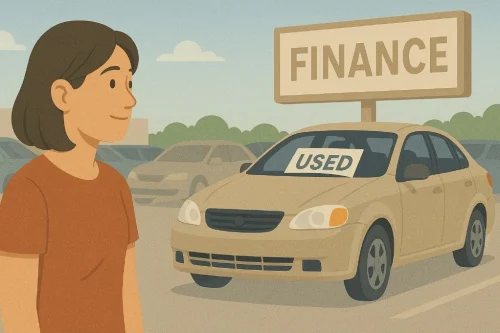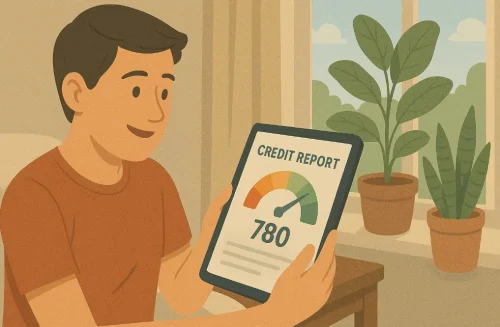Table of Contents
Buying a car in the UK using finance is a common route for many drivers. But when it comes to eligibility, there’s often confusion about what credit score you need.
Contrary to popular belief, there’s no fixed number that guarantees approval. Each lender has unique criteria and may consider more than just your credit score. Factors such as income stability, deposit size, and employment history also play a vital role.
In this comprehensive guide, we’ll explore how your credit score influences car finance approval and what you can do to improve your chances.
Why Does Your Credit Score Matter When Applying for Car Finance?

Your credit score is one of the key tools lenders use to assess how reliable you are as a borrower. It represents your financial history, including how you’ve managed previous loans and repayments. A higher score often leads to more favourable car finance terms, such as lower interest rates and flexible repayment options.
However, it’s not the only factor considered during approval. While someone with a high score may find it easier to get a deal, individuals with lower scores are not automatically excluded.
Here’s why your credit score still plays a significant role:
- It helps lenders assess risk
- Determines your interest rate and monthly payments
- Influences whether you need a larger deposit
- Can decide which type of finance product you’re eligible for
Ultimately, it shapes how confident a lender feels about lending you money and directly influences the terms, rates, and approval of your loan.
What Credit Score is Needed to Buy a Car?
There’s no universal credit score required to get car finance in the UK. Lenders assess creditworthiness differently and often use more than one credit reference agency. This means the definition of a “good” score can vary.
Typically, your score can fall into one of the following categories depending on the agency:
| Credit Score Range | Rating | Loan Access Likelihood |
| 961 – 999 | Excellent | Highest chance of approval and best rates |
| 881 – 960 | Good | Likely approval, good terms |
| 721 – 880 | Fair | Possible approval with higher rates |
| 561 – 720 | Poor | Limited options, stricter terms |
| 0 – 560 | Very Poor | Most lenders may decline |
Remember, even those with lower scores may qualify for finance, especially if they meet other key criteria like stable income or can provide a deposit.
What Other Financial Factors Do Lenders Look At Besides Credit Score?

Lenders don’t just focus on your credit score when reviewing your application. They assess your overall financial health to determine your affordability and reliability.
Here are the main factors they consider:
- Income and Affordability: A steady income ensures you can keep up with monthly payments.
- Employment Stability: Lenders prefer applicants who have been in long-term, stable jobs.
- Down Payment (Deposit): A larger deposit lowers the amount you need to borrow, reducing risk for the lender.
- Debt-to-Income Ratio: Your current debts versus your income are calculated to ensure you’re not overcommitted.
- Credit History: A history of on-time payments, responsible credit use, and no recent defaults boosts your approval chances.
- Type of Vehicle: Some lenders prefer newer, more reliable vehicles with better resale value.
Each of these factors is assessed alongside your credit score to get a full picture of your financial situation.
How Do Credit Score Ranges Affect Your Car Finance Options?
Different lenders use various credit reference agencies, and each has its own scoring system. However, in general, the higher your credit score, the more options you’ll have and the better the terms offered.
Here’s a breakdown of how score ranges typically affect your options:
| Score Band | Approval Odds | Typical Conditions |
| Excellent | Very High | Low interest rates, flexible terms |
| Good | High | Likely approval, moderate to low interest |
| Fair | Moderate | Higher rates may need a larger deposit |
| Poor | Low | Limited lenders, high APR, more documentation |
| Very Poor | Very Low | Specialist lenders only, high costs, low limits |
It’s important to note that being rated “Poor” by one agency may be “Fair” by another due to different scoring models.
Can You Get Car Finance with a Poor Credit Score?

Yes, it is possible to get car finance even with a poor or very poor credit score. While your options may be more limited, some lenders specialise in working with individuals who have experienced credit issues.
These lenders consider:
- The stability of your current income
- How much deposit you can afford
- Whether you’ve made recent positive credit changes
- The type of car you’re purchasing
If you can demonstrate financial responsibility, such as consistent employment and affordable monthly outgoings, you may still be eligible, though likely with higher interest rates and stricter terms.
How Do Lenders Check Credit Scores in the UK?
Before approving your car finance application, lenders will run a credit check. This helps them evaluate your borrowing history and determine whether you’re a reliable customer. There are two types of checks used:
Soft Search
-
- Doesn’t affect your credit score
- Used for eligibility checks or pre-approvals
- Only visible to you on your report
Hard Search
-
- Visible to other lenders
- Can impact your score slightly
- Performed when you proceed with a full application
In the UK, lenders may use one or more of the following credit reference agencies:
- Experian
- Equifax
- TransUnion
Each agency uses slightly different criteria, so your score may vary depending on which is used.
What Are the Best Ways to Improve Your Credit Score Before Applying?

If your credit score isn’t where you’d like it to be, don’t worry. There are practical steps you can take to improve it and boost your chances of car finance approval.
Review Your Credit Report
Check your credit report from all three major agencies, Experian, Equifax, and TransUnion. Look for outdated information, duplicate debts, or incorrect late payments.
Even small errors can unfairly reduce your score, so correcting them quickly ensures your profile reflects your true financial behaviour.
Pay Bills on Time
- Make it a habit to pay all bills, from rent and utilities to credit cards and loans, by the due date.
- Setting up direct debits, standing orders, or mobile reminders helps you stay consistent.
- Payment history makes up a large portion of your credit score, so timely payments carry significant weight.
Keep Credit Usage Low
Aim to use less than 30% of your total credit limit across all cards and accounts. For example, if your available credit is £5,000, try to keep balances under £1,500. This shows lenders you are not overly reliant on credit and can manage your finances responsibly.
Avoid Multiple Applications
- Limit the number of hard credit checks within a short period, as too many can signal financial distress.
- Instead, research your options carefully and apply only when you’re confident of approval.
- Spacing out applications helps maintain stability and avoids unnecessary score dips.
Register on the Electoral Roll
Being listed at your current address adds legitimacy to your profile, showing lenders where you live and providing proof of stability. Even if you don’t vote, registering boosts your credit file’s strength and helps confirm your identity.
Making these changes even a few months before applying can have a significant impact on your approval odds.
Do Better Credit Scores Mean Lower Car Loan Interest Rates?
Yes, generally speaking, individuals with higher credit scores are offered lower interest rates and more favourable repayment terms. Lenders see these borrowers as lower risk, meaning they’re more confident in their ability to repay.
With a good or excellent credit score, you may be eligible for:
- Lower annual percentage rates (APR)
- Longer repayment terms
- Smaller required deposits
On the other hand, applicants with fair or poor credit often face:
- Higher APR
- Shorter loan terms
- Larger upfront deposits
Improving your credit score even slightly can reduce your borrowing costs significantly over time.
How Can You Apply for Car Finance Without Damaging Your Credit Score?

Applying for car finance can feel daunting, especially if you’re worried about how it might affect your credit score. The good news is that with careful planning, you can explore options without causing unnecessary harm to your financial profile.
Smart ways to protect your credit score
- Use soft search tools: These allow you to check eligibility and compare deals without leaving a mark on your credit report.
- Avoid multiple hard applications: Too many hard checks in a short time can drag your score down temporarily.
- Check your credit report first: Reviewing it early helps you spot errors or issues you can fix before applying.
- Consider pre-approval services: They show potential approval odds and rates without committing or damaging your score.
- Apply with a trusted broker: Brokers can match you to the right lenders, helping avoid unnecessary rejections.
By following these steps, you can confidently apply for car finance while keeping your credit score safe and secure.
Conclusion
There’s no set credit score needed to buy a car in the UK, as lenders assess applications using a mix of financial and personal factors.
While a strong credit score improves your access to competitive rates and more flexible options, it’s not the sole deciding factor. Employment history, income stability, and the size of your deposit are equally important.
With the right preparation, including checking your credit report and exploring specialist lenders if necessary, you can increase your chances of getting the car finance that suits your budget and lifestyle.
Frequently Asked Questions
Can self-employed individuals get approved for car finance in the UK?
Yes, but they may need to show proof of steady income through bank statements, tax returns, or SA302s.
How long does a missed payment affect your credit score?
Missed payments can stay on your report for up to six years, although their impact lessens over time if your credit behaviour improves.
Is joint car finance a good idea to boost approval chances?
Joint applications can be helpful if one applicant has a stronger credit profile, as combined income and score may improve eligibility.
Does the type of car you buy affect finance approval?
Yes, lenders may favour newer, lower-mileage vehicles that hold value better, reducing their risk.
Can I get car finance if I’ve recently changed jobs?
Possibly, but some lenders may require a few months of payslips or evidence of stable income before approval.
What is the ideal debt-to-income ratio for car finance approval?
Ideally below 35%, though some lenders may accept slightly higher ratios depending on other strengths in your application.
Will being on the electoral roll improve my chances of finance approval?
Yes, it helps verify your identity and address, making you appear more creditworthy to lenders.




